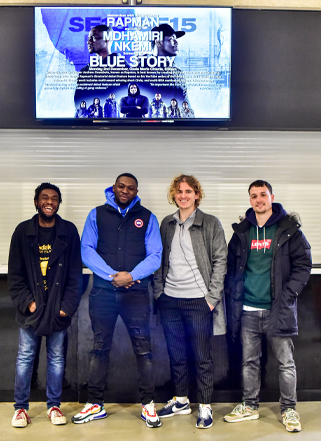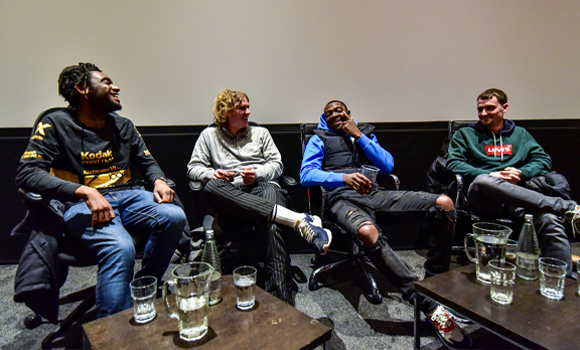Blue Story’s Writer-Director Rapman and Crew Visit NFTS for Screening and Q&A
Writer-Director Rapman was welcomed to the NFTS earlier this week for an enlightening Q&A following a screening of his hard hitting debut film, Blue Story. Rapman was accompanied by the film’s Editor and NFTS graduate Mdhamiri A Nkemi, Cinematographer Simon Stolland and Composer Jonathon Deering.

The group sat down with Peter Dale, NFTS Head of Documentary to discuss storytelling, the process of making Blue Story and getting advice from rap giant Jay-Z!
Set in South London, Blue Story is an adaptation of Rapman’s YouTube series, following the story of two young friends, Timmy (Stephen Obudola) and Marco (Michael Ward) who become rivals in a postcode war.
Blue Story hit the headlines during its first week of release after a cinema chain temporarily withdrew the film, following a disturbance near one of its cinemas in Birmingham. Referencing the incident which attracted widespread publicity, Rapman commented that it had been “a blessing and a curse,” due to the film losing revenue in its opening weekend. With Blue Story since securing the sixth best opening of any British film during 2019, Rapman praised the unwavering support of the film’s distributor, Paramount and contemplated the effect recent events have had on its release: “The press we’ve had [around the launch of the film], you can’t buy.”
Not wanting to dwell on the controversy, Rapman detailed the genesis of Blue Story, which began as a YouTube video in 2013. He released it in three parts which resulted in countless comments calling for it to become a film. “I didn’t know how to write a film at the time. I started off writing on Microsoft Word.” After being given a cheap version of screenwriting software Final Draft, Rapman began his writing journey in earnest, adding to the script every day to see if he could write a feature length film.
Once the script was finally finished, Rapman moved onto his next project, Shiro’s Story, a music video combined with a short film. It was once again released in separate parts via YouTube. Rapman recalled his surprise at the success and positive feedback he received for Shiro’s Story. “I put the first one out saying; “’if it gets a million views I’ll do part two.’ I’d never had a million views in my life so I didn’t think I was ever going to make a part two.”
Speaking about the soundtrack for both Shiro’s Story and Blue Story, Rapman revealed that his style of using rap to tell stories is now his “USP”. Praising Jonathon’s composing role he said: “What’s weird with my type of films is that we have a producer like Kaze Beats who makes my instrumentals, then we have the traditional score type producer. We mix it in, kind of like the traditional with the new.”
He continued to describe how he’s always loved the marriage of story and music, growing up watching musicals like West Side Story, Grease and The Sound of Music. Rapman attributes watching “a lot of TV and film” for learning how to write stories himself and how attending a Catholic school also informed his love of storytelling: “a lot of the Biblical stories were drilled into me.”

When asked about the editing process on Blue Story, NFTS Editing MA graduate Mdhamiri revealed much of the original script remained unchanged from the first time he read it to the final film. One key development was the inclusion of archive footage within the film: “We wanted to make it feel really grounded and have that sense of reminding you that this is actually happening.”
Continuing, he described how Rapman’s style of weaving the rapping into the dialogue really aided the storytelling as it allowed them to elaborate on sections that needed explaining or to signify the passing of time in an engaging way: “It’s actually really, really useful as an editor.”
Mdhamiri and Jonathon discussed their collaboration process and how the score affected the final edit. Mdhamiri was keen to express how much he enjoys the relationship with the composer and music in film in general. “Towards the end we were going ‘oh, this music reminds me of Leah so then maybe we don’t need a shot of Leah we just play that music over Timmy and that reminds you of that relationship.’ I just really like that collaboration.”

Rapman reminded the NFTS student directors in the room of the importance of having a good relationship and rapport with the editors they work with. In particular, he highlighted that at the end of the filming process it is up to the director and the editor to get the film finished on time: “It’s so vital that your editor is on the same page.”
The viral success of Shiro’s Story worked to Rapman’s advantage further down the line as it allowed him to be selective when choosing which company he was going to make Blue Story with. He recalled attending meetings whereby if he couldn’t secure his own creative control, he would move onto the next one. “The story was one I based on personal experience so I wasn’t going to let a company come in and tell me to change it or else there’s no point in me doing it.”
Much of the confidence needed to stand up for his work came after signing a deal with Jay-Z’s company Roc Nation, including management, television, film and his own record label. Describing a conversation where Jay-Z encouraged him to stand up to anyone that was trying to change his script, Rapman said: “He’s like ‘Don’t do it, I wouldn’t do it’ and I was like ‘yeah but you’re Jay-Z’...and he goes, ‘the power is not in who you are, it’s about what you are, and they came to you because of what you do and what you can achieve. So if they come to you for your talent, stand by your talent.’”
Rapman made the point that although it can be a great opportunity to have a big name backing you, success is still ultimately down to the individual: “You still have to do your own work. He [Jay-Z] can put me in a room with Netflix, but it’s up to me to pitch the show.”
Rapman and Simon described how their years of making low-budget short films taught them how to be flexible on set. Their guerrilla way of filming trained them to be able to improvise efficiently and adapt to last minute changes. “I think directors and DoP’s need to be ready for that…if you’re a director and you have a storyboard which has crumbled, you have to be ready to improvise because you don’t know what’s going to happen on the day."
Responding to a student who observed how Blue Story makes you care deeply for the characters, Rapman expressed the importance of taking your audience on a journey to build that relationship. With the aim of eliciting powerful emotions among the audience at key plot points throughout the film, he said: “if [the audience] don’t care about those things, they’re never going to care about what you do with the characters at the end.”
Rapman ended a lively Q&A with some advice for the assembled students, some of whom are putting the finishing touches to their graduation films, ready to showcase in February 2020. “You’re going to come across all of these push-backs…but once people watch [your film] they don’t see all of that. As long as what you present to them is good, you’re going to be alright.”
Blue Story is in cinemas now, distributed by Paramount.

